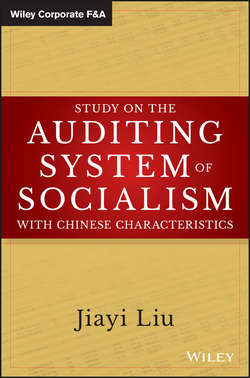Читать книгу Study on the Auditing System of Socialism with Chinese Characteristics - Liu Jiayi - Страница 6
На сайте Литреса книга снята с продажи.
Introduction
1. ABOUT THE SYSTEMS
ОглавлениеA system can be viewed in both broad and narrow senses. In a broad sense, it refers to a normative system of politics, economy, society and culture forming under certain historic conditions, that is, political system, economic system, social management system, and so forth. In a narrow sense, it refers to work procedures or action guidelines by which all parties should abide. As Karl Marx pointed out in Capital, a social system is a political instrument of a specific ruling class. It is a social structural framework of productive relations in a particular period, and also a fundamental rule of people’s economic actions at a specific productivity level. The fundamental driving force for system evolution comes from the development of productive forces. Some scholars, however, defined system from different perspectives. For example, Douglass C. North has argued that a system involves the game rule of a society. Theodore William Schultz saw it as a code of conduct governing the acts of a society, its politics, and its economy. John Rawls defined it as a kind of social system of norms, and so forth. Despite these different definitions, it can be concluded that a system has three basic features.
First, system has a historical feature. The generation of systems is not different from other products of human civilization. Systems did not exist intrinsically but were products of the development of human society at a certain historical stage. Marxism thought that the form, model, and level of systems were adaptable to the development level of productive forces, that is, “Production and subsequent exchange of products are the foundation of all social systems”1; “There will be particular social systems, families, classes or class organizations at a certain development stage of production, exchange and consumption.” 2 Development and changes of systems reveal they are also reforming and adapting to the development of human society. “No system can come out of nothing abruptly. A system is gradually developed based on the original source. A system will never disappear without any reason, and there must be changes. A system would be gradually deteriorating and changing before its disappearance. Only in such a manner can we seize the truth of all systems.”3 To judge a system, we “must also know the opinions of all related parties during implementation,” and these are referred to as historical opinions.4
Second, system is a term covering social relations. Systems are normative criteria that regulate the social relationships and determine the rights and obligations of relationships among people, and among organizations. Along with the development of the economy and the society, individuals hardly realized the desired effect by themselves alone. Accordingly, the subjects of communication presented a diversity whereby the communication scope was extended from individuals to communities, organizations, ethnic groups, and countries. Especially in a modern society, the communication among communities goes far beyond individuals. This process gives birth to systems. In this sense, systems refers to standardization achieved during production and communication, formed according to cultural traditions and historical experience, to safeguard the order of production and social development, meet common social needs and coordinate the behavioral relations among humans and with society. “Understanding of systems in an era must be inseparable from deep cognition of humans.”5
Third, a system has a hierarchical feature. The literature of institutional economics presents a different understanding to the composition of systems. Some have argued that a system involves an institutional environment, institutional arrangements and implementation mechanisms. Some believe a system consists of a constitutional environment, institutional arrangements, and implementation mechanisms. Others divide a system into three types, namely, official and unofficial rules and their execution mechanisms. The official rules include social systems, laws, rules and regulations, code of ethics, disciplines, and so forth; unofficial rules refer to the established codes of conduct formed through long-term social communication of people, and publicly recognized as norms to be jointly abided by, including values, manners and customs, cultural traditions, ethics, ideologies, and so on. Although without the dominant executive force and binding force, the unofficial rules constitute a theoretical foundation and the supreme principle of official institutional arrangements (or official restrictions) in the forms of “guiding principle,” “guideline,” “principle,” and so on. Oliver Williamson divided the general institutional framework into four interrelated levels: the first covers the history and the culture of a country, including traditional customs, code of ethics, and so forth. These are “unofficial rules”6 proposed by Douglass C. North; the second level covers the basic institutional environment, including the Constitution, and the fundamental systems, and so on of a country; the third level involves various governance mechanisms; and the fourth refers to a short-term resource distribution system. Each level is subject to the higher. 7 It can be said that systems are closely related to economic and social development. To understand a system thoroughly, we need to analyze the logic of various rules and essentials, and also need to make in-depth analysis on the history of its generation and development, as well as the background of the times and the basic institutional environment.
1
Engels: Socialism: Utopian and Scientific. Marx Engels Selected Works, 2nd ed., Vol. 3. Beijing: People’s Publishing House, June 1995, pp. 740–741.
2
Complete Works of Marx and Engels, Vol. 4. Beijing: People’s Publishing House, June 1995, pp. 320–321.
3
Chien Mu, China’s Rise and Fall, 1st ed., New Revision. Beijing: Jiuzhou Press, 2012, p. 2.
4
Ibid.
5
Ibid., p. 1.
6
(U.S.) Douglass C. North, “New Institutional Economics and Development,” in Transition, Rules and Institutional Choice, edited by Sun Kuanping. Beijing: Social Sciences Academic Press, 2004, pp. 3–4. (“North” mentioned in this paragraph remains consistent with the commonly used expressions hereof.)
7
Paul L. Joskow, A Report Card. June 2, 2004; Oliver Williamson, a representative personage of new institutional economics. About systems levels, refer to Joskow.
